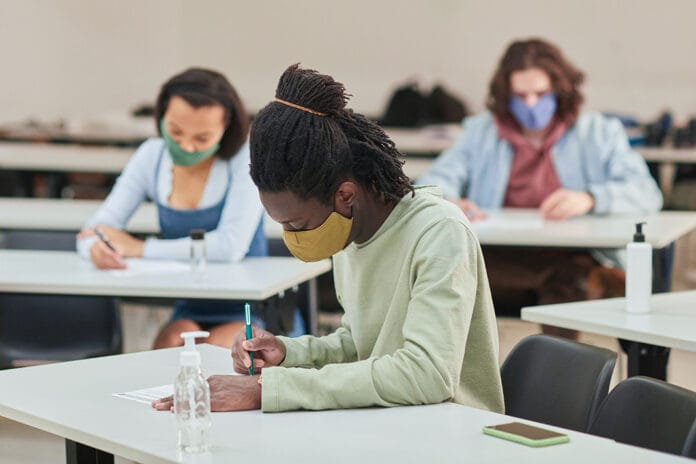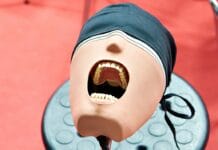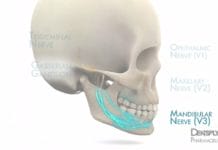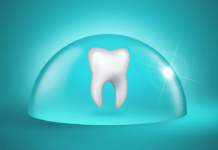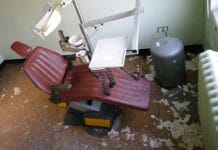The sun is barely out this morning, and my six clinic buddies and I wait in our cars in the campus parking lot. When the clock hits seven, our dental hygiene instructors emerge from the building holding baskets that contain thermometers, masks, and sanitizers.
We wear our masks and lower the windows. They greet us and take our temperatures, ask the COVID-related questions, and then document it. Once they OK us, only then can we enter the clinic premises.
This is the new normal. COVID has changed our world drastically, and that includes dental hygiene school.
Always Meticulously Clean as Doors Stay Open
Let’s be realistic. The very first thing that instructors drill into us upon entering dental hygiene school is infection control. The fact that “hygiene” is literally our job description makes it very clear that we will be meticulous with “clean” no matter what.
The hygiene department at Collin College in North Texas decided not to close or go online during the pandemic. That meant taking many safety measures for the students, faculty, and clinic patients. As far as infection control is concerned, we did not have to drastically change our clinic routine. We were meticulous with disinfection, sterilization, and barriers even before the pandemic.
Still, we added new measures to make it safe for ourselves and our patients. Instead of patients coming to the reception area, we met patients in their cars, giving them fresh masks, recording their temperatures, and taking a history of COVID-related questions (documented in their medical histories). We also gave patients a prerinse and asked them to wash their hands before sitting in our operatory. We wore N95 masks with face shields and, initially, we were only allowed hand scaling. Later, ultrasonics were allowed for periodontally involved patients but only if we used high-volume suction.
Missing the Hugs and Camaraderie
Infection control aside, studying during the pandemic has made the student life so much different. Our classroom seating arrangements were changed. Desks were moved apart. We disinfected our desks and chairs at the beginning and end of classes. We wore masks through didactic classes.
Our common room that was the bustling center of student life, went quiet. We had bonded in the common room over lunch breaks, met with the other class, asked questions about what to expect next year, and take tips from one another. Suddenly, we hardly saw the other class. I haven’t even seen their full faces ever since they joined this semester.
Before COVID, when there was a really rough day, our teachers would give us a pat on the back or a hug that helped. But, sadly now, that is no more.
Additional Stress in a Stressful Environment
In one way or the other, everyone has been affected by COVID. Some lost their jobs, and others lost their loved ones. There is a looming uncertainty at all times. Hygiene school is tough and stressful without the added garnishing of COVID-related stress.
The stress related to COVID has increased breakdowns among students. Now the worry is not just about getting good grades. Some students worry for their spouses who have been laid off, and others have kids who have tested positive. So now they have to stay home and study via Zoom and pray that their clinic requirements are not affected.
Finding patients had become a challenge since many people fear going out and limiting their non-emergency medical procedures. Our program is very vigilant about finding proper PPE ─ quite a challenge since the prices of good PPE have skyrocketed. I jokingly tell my instructors that our class might be the costliest class the department has ever had.
Learning to Adjust
Despite the challenges, I still think my batch of classmates has benefitted. My class is still extra careful about disinfection. Now that the vaccination process is well underway, and most of my classmates and instructors have been vaccinated, I still feel the extra safety measures will remain, and my class got trained first-hand in them. Every time one of us gets vaccinated, we cheer for them, and then we exchange notes on what symptoms they experienced. We are also able to share our vaccination experience with our patients, which might help them get motivated to get vaccinated.
We have also learned to work in such uncertain times. Improvisation has been a key in many aspects of our lives. When we were unable to go for our community rotations, our community teacher suggested that we make a fun educational video for young kids to teach OHI. In the video, we show a “Hygienie” who grants oral hygiene wishes to a kid who is curious about going to a dental clinic.
The bond between students and teachers has become stronger. Our program director came up with the term “giving grace,” which in these testing times means that we give everyone some breathing space. Things are not black and white all the time, and adjustments are made. Counseling is given to students if the pressure of studies combined with the effects of the pandemic is affecting their mental health or performance.
The friendships between classmates have become stronger with the knowledge that we are in this together. We give each other a shoulder to cry and a sympathetic ear to listen. If anyone misses a class, we are there to help them out in any way possible. If we have an extra patient, we are more than happy to give it to our classmate.
We have learned to work under stress, we are more sympathetic, and we know that not all things are in our control. I don’t know if the way my class studied through the pandemic is going to become a new standard or are we to become a unique group who will write in our CVs that we braved these uncertain times. But it sure gives us many stories to tell for years to come.
This incredible journey will not only make us good clinicians but hopefully better human beings.

